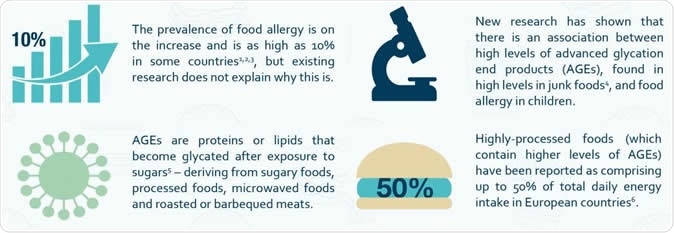Many childhood food allergies could be due to eating junk food, according to a new study. Children with food allergies, and children who eat a lot of junk food, have increased body levels of molecules called advanced glycation end-products (AGEs).
AGEs are proteins or fats found in foods that react with sugars to become glycated. They are therefore abundant in processed foods that are packed with sugar and fat like bacon, cake, pizza and burgers. Microwaved foods, as well as barbecued or roasted meat, are also high in AGEs.

The role of AGEs in the development of food allergy. CREDIT: ESPGHAN
AGEs are involved in a host of disease conditions caused by or linked to excessive oxidation, like diabetes and atherosclerosis, rheumatoid arthritis, and some diseases of the nervous system. However, the relationship with food allergy is novel.
A new study from researchers at the University of Naples 'Federico II looked at the level of AGEs in the tissues just below the skin, in a group of 61 children between 6 and 12 years old. These children were initially classified into three groups: healthy controls, those with food allergies, and those with respiratory allergies. Their eating was monitored for seven days by food diaries which were kept by the parents.
Researchers found that children with food allergies consumed approximately 20% to 40% more junk food (on average) compared to the other two groups, including those with respiratory allergies. There was a significant association between the level of AGEs and junk food consumption as well.
In the UK, 7% of children have food allergies, and 3% of adults. The number is rising, especially in young children, though the reasons are not clear. In 2016-17, for instance, the number of food allergies causing anaphylactic shock, a life-threatening allergic reaction, went up from about 1400 to almost 2000 cases. Pollution and excessive hygiene preventing required microbial-immune cell contact may be factors in this situation.
This research suggests that a junk food-related rise in AGEs is also instrumental in this trend, because of the parallel increases in food allergy and the consumption of highly processed foods.
In fact, in Europe, people get up to half of all their daily energy intake from highly processed foods. This could mean that eating a lot of junk food has contributed significantly to increasing food allergies in children. “ [Children] are consuming a lot of snacks, a lot of hamburgers, a lot of French fries, a lot of commercial foods full of AGEs,” said Roberto Berni Canani, principal investigator.
Canini commented: “As of yet, existing hypotheses and models of food allergy do not adequately explain the dramatic increase observed in the last years - so dietary AGEs may be the missing link. Our study certainly supports this hypothesis, we now need further research to confirm it. If this link is confirmed, it will strengthen the case for national governments to enhance public health interventions to restrict junk food consumption in children.” He recommends eating more legumes, fish, vegetables, whole grains and fruits, and low-fat dairy.
The researchers also found some indications that AGEs could be directly toxic to immune cells, and could disrupt the gut mucosal barrier, allowing toxins and allergens to come into contact with deeper body tissues.
However, they do not rule out the effect of many other factors including abnormalities of the gut bacterial populations. Other experts suggest that children who eat more junk food will likely not eat much fresh fruit and vegetables, or fish, all of which are likely to reduce the allergy risk. High junk food consumption may also be linked to a higher risk of living in a polluted area, and to other lifestyle factors that are common to this group.
If the current findings are confirmed by further research, it will be up to public health authorities to discourage junk food consumption by children. At present, we do not know the AGE level in most of the foods we eat. Many of the industrial processes through which fast foods are made are injurious to our health. At the same time, the current study is too small to make any definitive conclusions, but it does present some attractive hypotheses that need to be explored in larger populations and different types of people.
The study was presented at the 52nd Annual Meeting of the European Society for Paediatric Gastroenterology Hepatology and Nutrition (ESPGHAN).
Sources:
- Eurekalert.org. Researchers warn: junk food could be responsible for the food allergy epidemic. https://eurekalert.org/pub_releases/2019-06/sh-rwj053019.php
- Berni Canani, R, et al (2019). How junk food can contribute to the food allergy epidemic: the potential role of advanced glycation endproducts. Presented at the 52nd Annual Meeting of ESPGHAN.